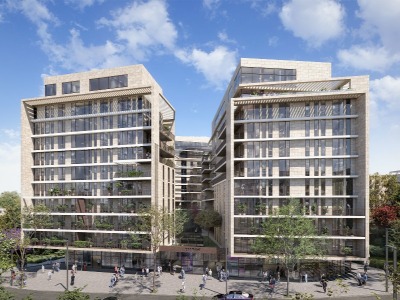
The Israeli real estate market is entering uncharted territory in Q1 2024, with recent events, notably the 7/10 attack and the ensuing conflict in Gaza, casting a significant shadow over the buying and selling landscape. These incidents have indelibly marked sellers and buyers, elevating security concerns and shaping decisions within the real estate sector. As we explore upcoming trends, it's crucial to consider how these incidents, coupled with a global upswing in antisemitism, may mold the Israeli real estate landscape.
In the aftermath of the 7/10 attack, Israeli sellers are grappling with increased scrutiny and a reevaluation of property values, especially in regions directly impacted by security challenges. Prospective buyers, more than ever, prioritize safety features and security considerations in their property search. These evolving dynamics underscore the need for a nuanced understanding of the market, particularly in areas directly affected by security events.
The ongoing conflict has disrupted the construction industry, impacting the building of new apartments due to a shortage of Palestinian workers traditionally employed in various construction roles. Delays in project timelines, planning of new developments, and increased construction costs have potentially constrained the supply of new housing units, contributing to a more competitive environment for available properties.
A notable trend shaping the Israeli real estate market is the increased interest from foreign Jewish communities in making aliyah and moving to Israel. The upsurge in antisemitism in the diaspora, especially since 7/10, has prompted a growing number of foreign Jews to consider relocating to Israel. However, to date, this interest has been slow to materialize due to the ongoing war, the security situation, and the lack of steady flights to Israel. Anticipating that this interest will start to materialize more significantly in 2024, we expect it to exert upward pressure on property prices as demand from foreign buyers increases. This influx of new residents could bring about changes in the real estate landscape, adding another layer of complexity to market dynamics.
One of the foremost concerns for homeowners and prospective buyers is the trajectory of property prices. Analysts cautiously anticipate a modest increase in property prices in Q1 2024, driven by factors such as increased demand, economic recovery, and limited housing supply. It is essential to note that prior to 7/10, the market was slowly recovering from a slowdown caused by increased mortgage rates and the political instability of 2022-2023. Transactions and prices began to increase in August and September 2023, but it remains unclear whether this trend will continue post-war or if current events will expedite or impede the market's recovery. Therefore, investors must monitor market dynamics and seek professional advice before making transactions in these uncertain times.
For those contemplating a property purchase, mortgage rates play a pivotal role in the decision-making process. As Q1 2024 unfolds, there is a prevailing expectation that mortgage rates in Israel may see a slight decrease. Global economic factors, central bank policies, and efforts to stimulate housing affordability contribute to this potential shift. Prospective buyers are recommended to act sooner rather than later, given this expectation. However, staying informed about any changes in interest rates is crucial for making well-informed financial decisions.
In regions most threatened by security concerns, such as areas susceptible to mortar attacks (generally in the North and South of the country), the real estate market may witness unique trends. Historically, such areas have experienced fluctuations in property values due to security considerations. While some analysts predict a potential decrease in prices in these regions, others argue that the overall demand for secure housing may counterbalance this effect. It remains essential for buyers to carefully assess both the security situation and market dynamics before making decisions in these areas.
In response to ongoing security challenges, properties equipped with security rooms are expected to be in higher demand, resulting in an upward trend in prices. This is a novel trend; security rooms were previously a small consideration in choosing or pricing property. Homebuyers seeking added security measures and peace of mind may find themselves willing to invest more in properties that offer these features.
As we navigate the uncertainties of the real estate market in Q1 2024, it is crucial for buyers, sellers, and investors to stay informed about evolving trends. Projections suggest a potential increase in property prices, but a nuanced approach is required to understand the complex interplay of factors. The anticipated rise in interest from foreign Jewish communities adds a new dimension to the market, emphasizing the need for a comprehensive understanding of the factors shaping the Israeli real estate landscape. In these uncertain times, consulting with professionals before making transactions becomes critical for both buyers and sellers alike.
The writer is the Broker/Owner of RE/MAX Vision, with strategically located offices in Geman Colony, Jerusaelm, and Ma’ale Adumim. Ariyel was called up to military service on 7/10 and has been serving ever since. For inquiries and expert guidance, you can reach Ariyel at +972-545-777-509 or via email at [email protected] or his website www.remaxjerusalem.com


As we step into 2024, many are left wondering: Is now the right time to invest in real estate? With interest rates fluctuating, economic uncertainties lingering, and the housing market showing signs of both resilience and volatility, it's only natural one might feel uncertain about making such a significant financial decision.

The recent months have demonstrated how deeply the spirit of volunteering and community contribution is embedded in Israeli society. Yet, alongside the impressive enrolment of many individuals and businesses during the war on Hamas, there are entities for whom community responsibility has long been a way of life.

Whether you are a first time buyer, upgrading or downsizing your current apartment, an investor or buying a vacation apartment in Israel, you are probably asking yourself whether it’s the right time to buy.

Where and what type of property should I purchase? What areas offer the best value? What are the up-and-coming locations? How much can I afford to invest in my purchase? Should I buy a new property or renovate? And how do I go about the complex process?
Tell us what you are looking for, and we will be happy to be of service to you